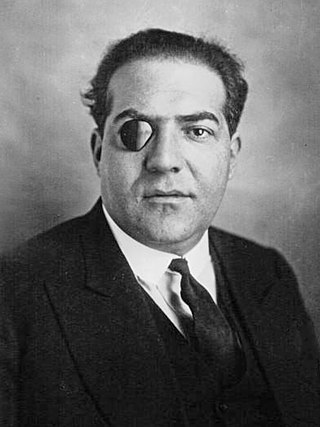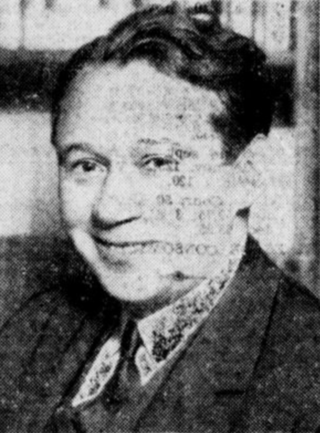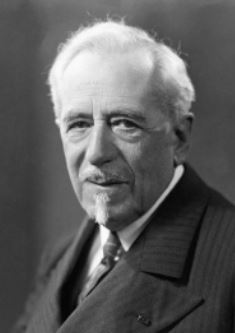
Pierre Eugène Drieu La Rochelle was a French writer of novels, short stories, and political essays. He was born, lived and died in Paris. Drieu La Rochelle became a proponent of French fascism in the 1930s, and was a well-known collaborationist during the German occupation. He is best known for his books Le Feu Follet and Gilles.

Otto Friedrich Abetz was a German diplomat, a Nazi official and a convicted war criminal during World War II.

Fernand de Brinon, Marquis de Brinon was a French lawyer and journalist who was one of the architects of French collaboration with the Nazis during World War II. He claimed to have had five private talks with Adolf Hitler between 1933 and 1937.

Xavier Vallat, French politician and antisemite who was Commissioner-General for Jewish Questions in the wartime collaborationist Vichy government, and was sentenced after World War II to ten years in prison for his part in the persecution of French Jews.

La Nouvelle Revue Française is a literary magazine based in France. In France, it is often referred to as the NRF.

Counter-admiral Gabriel Paul Auphan was a French naval officer who became the State Secretary of the Navy of the Vichy government from April to November 1942.

Henri Albert François Joseph Raphaël Alibert was a French politician known for his association with the collaborationist regime of Vichy France during World War II. A royalist, traditionalist, and member of Action Française, Alibert was one of the chief ideologues of the constitutional law that transformed the French Third Republic into an authoritarian state under the rule of Marshal Philippe Pétain.

The National Popular Rally was a French political party and one of the main collaborationist parties under the Vichy regime of World War II.

L'Illustration was a French illustrated weekly newspaper published in Paris. It was founded by Édouard Charton with the first issue published on 4 March 1843, it became the first illustrated newspaper in France then, after 1906, the first international illustrated magazine; distributed in 150 countries.

Georges Suarez, was a French writer, essayist, journalist, and jurist. Initially a pacifist during the rise of Nazi Germany, he later became a right-wing journalist and collaborator. He had been editor of Aujourd'hui, a French newspaper controlled by the Third Reich after the resignation of the writer Henri Jeanson. Suarez was also the biographer of Philippe Pétain, and other figures of the French Third Republic. He was the first journalist sentenced to death during the Épuration légale.

Vichy France, officially the French State, was the French rump state headed by Marshal Philippe Pétain during World War II. It was named after its seat of government, the city of Vichy. Officially independent, but with half of its territory occupied under the harsh terms of the 1940 armistice with Nazi Germany, it adopted a policy of collaboration. Though Paris was nominally its capital, the government established itself in the resort town of Vichy in the unoccupied "free zone", where it remained responsible for the civil administration of France as well as its colonies. The occupation of France by Nazi Germany at first affected only the northern and western portions of the country, but in November 1942 the Germans and Italians occupied the remainder of Metropolitan France, ending any pretence of independence by the Vichy government.

The Holocaust in France was the persecution, deportation, and annihilation of Jews between 1940 and 1944 in occupied France, metropolitan Vichy France, and in Vichy-controlled French North Africa, during World War II. The persecution began in 1940, and culminated in deportations of Jews from France to Nazi concentration camps in Nazi Germany and Nazi-occupied Poland. The deportation started in 1942 and lasted until July 1944. Of the 340,000 Jews living in metropolitan/continental France in 1940, more than 75,000 were deported to death camps, where about 72,500 were murdered.
Hervé Cras was a French military and naval historian, who wrote under the pseudonym Jacques Mordal.

The Sigmaringen enclave was the exiled remnant of France's Nazi-sympathizing Vichy government which fled to Germany during the Liberation of France near the end of World War II in order to avoid capture by the advancing Allied forces. Installed in the requisitioned Sigmaringen Castle as seat of the government-in-exile, Vichy French leader Philippe Pétain and a number of other collaborators awaited the end of the war.
Led by Philippe Pétain, the Vichy regime that replaced the French Third Republic in 1940 chose the path of collaboration with the Nazi occupiers. This policy included the Bousquet-Oberg accords of July 1942 that formalized the collaboration of the French police with the German police. This collaboration was manifested in particular by anti-Semitic measures taken by the Vichy government, and by its active participation in the genocide.

The Government of Vichy France was the collaborationist ruling regime or government in Nazi-occupied France during the Second World War. Of contested legitimacy, it was headquartered in the town of Vichy in occupied France, but it initially took shape in Paris under Marshal Philippe Pétain as the successor to the French Third Republic in June 1940. The government remained in Vichy for four years, but fled to Germany in September 1944 after the Allied invasion of France. It operated as a government-in-exile until April 1945, when the Sigmaringen enclave was taken by Free French forces. Pétain was brought back to France, by then under control of the Provisional French Republic, and put on trial for treason.
The Second French Statute on the Status of Jews, of 2 June 1941, was an anti-semitic law enacted under Vichy France and signed into law by the Head of the French State, Marshal Philippe Pétain. It replaced the first Law on the status of Jews of 3 October 1940. It included an increasingly stringent definition of who was a Jew in France. It specified a legal definition, of the term Jewish race, broadening its criteria for inclusion and extending the scope of the existing professional prohibitions. From that point on, Jews in France became second-class citizens, while they had since 21 September 1791 been full citizens.

The Law of 3 October 1940 on the status of Jews was a law enacted by Vichy France. It provided a legal definition of the expression Jewish race, which was used during the Nazi occupation for the implementation of Vichy's ideological policy of "National Revolution" comprising corporatist and antisemitic racial policies. It also listed the occupations forbidden to Jews meeting the definition. The law was signed by Marshall Philippe Pétain and the main members of his government.
Maurice Léopold Joseph Bouly de Lesdain was a French botanist and lichenologist.

Paul René Baschet was a French journalist; best known as the director of L'Illustration.















